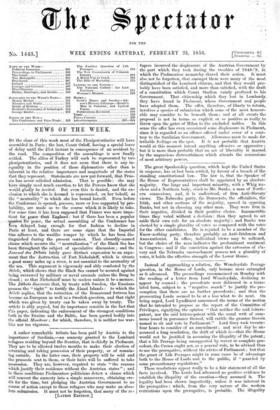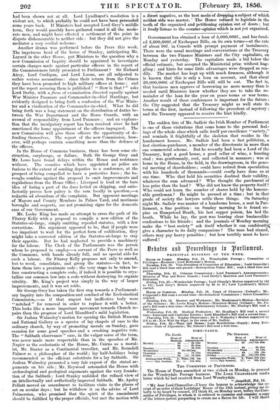Instead of approaching a solution, the Wensleydale Peerage question, in
the House of Lords, only became more entangled as it advanced. The proceedings recommenced on Monday with the reading. of a letter from Lord Wensleydale, declining to appear by counsel ; the precedents were delivered in a trans- lated form, subject to a "negative search" to justify the pre- sumption that there are no further precedents ; and then the prosecuting Lords seemed to be at a loss what to do next. On being urged, Lord Lyndhurst announced the terms of the motion' that he intended to propose as the report of the Committee of Privileges, signifying the opinion " that neither the said lettere- patent, nor the said letters-patent with the usual writ of sum- mons issued in pursuance thereof, will entitle the grantee therein named to sit and vote in Parliament." Lord Grey took twenty- four hours to consider of an amendment ; and next day he an- nounced a long resolution, the drift of which is—that the House would not be justified in assuming the illegality of the patent ; that a life Peerage being unsupported by recent or complete pre- cedent, the Crown ought not, as a general rule, to be advised thus to use the prerogative, without the advice of Parliament ; but that the grant of Life Peerages might in some eases be of advantage both to the House of Lords and to the public, if " guarded by some precautionary regulations."
These resolutions appear really to be a fair statement of all the facts involved. The Lords had advanced no positive evidence to establish the illegality of the creation—they assumed it. The legality had been shown imperfectly, unless it was inherent in the prerogative ; which, from the very nature of the modern restrictions upon the prerogative, is probable. The illegality had been shown not at all. Lord Lyndhurst's resolution is a violent act, to which probably he could not have' been persuaded some years back. If Ministers had accepted Lord Grey's middle term, they would possibly have gathered round it all the mode- rate men, and might have effected a settlement of the point in dispute dishonourable to neither side : but they did not give the mediator a very cordial welcome.
Another drama was performed before the Peers this week. The impetuous head of the house of Stanley, anticipating Mr.
Layard in the other House, put Ministers to the question why a new Commission of Inquiry should be appointed to investigate certain charges made against particular officers in the report of the Commissioners lately presented to Parliament ? Sir Richard
Airey, Lord Cardigan, and Lord Lucan, are all subjected to rather serious accusations : since their return from the Crimea they have been promoted to high military offices at home ; and yet the report accusing them is published ! " How is that ?" asks Lord Derby, with a form of examination directed equally against War Minister Panmure and Commander-in-chief Hardinge, but evidently designed to bring forth a confession of the War Minis- ter and a vindication of the Commander-in-chief. What he did bring forth was a long statement on the distribution of duties be- tween the War Department and the Horse Guards, with an avowal of responsibility from Lord Panmure ; and an explana- tion that the inculpatory report has been received since he had sanctioned the home appointment of the officers impugned. The new Commission will give those officers the opportunity of de- fending themselves. The report of the new Commission, how- ever, will perhaps contain something more than the defence of the officers.
In the House of Commons business, there has been some ob- struction, surplusage, or failure. Both Sir George Grey and Mr. Lowe have found delays within the House and resistance without. The counties which have appointed no police are furious to the extent of sending deputies to a conference, at the prospect of being compelled to have a protective force ; the bo- roughs combine against the proposal to emit improvements and regulations from the Home Office ; Liverpool is loud at the bare idea of losing a part of the dues levied on shipping, and satis- factorily proves how paltry is the sum locally in question,—a reductio ad absurdum of the complaint. But opponent meetings of Mayors and County Members in Palace Yard, and mutinous boroughs and seaports, are not promising signs for the domestic ease of our Government.
Mr. Locke King has made an attempt to cross the path of Sir Fitzroy Kelly with a proposal to compile a new edition of the Statutes-at-large, simply omitting repealed statutes, with a few corrections. His argument appeared to be, that if people were too impatient to wait for the perfect form of codification, they might take a corrected edition of the Statutes-at-large to stay their appetite. But he had neglected to provide a machinery for the labour. The Clerk of the Parliaments was the person whom he proposed to employ—a servant of the Peers as well as the Commons, with hands already full, and no special aids for such a labour. Sir Fitzroy Kelly proposes not only to amend, but to weed, consolidate, and group the statutes—in fact, to form them into a proximate code ; the very stage to be taken be- fore constructing a complete code, if indeed it is possible to crys- tallize our common law into a code without destroying its organic vitality. Mr. King's project was simply in the way of larger improvements, and it was set aside.
Sir George Grey has taken the first step towards a Parliament- ary inquiry into the composition and conduct of the Ecclesiastical Commission,—as if that august but ineffective body were " notched " for removal in order to replace it with a better. This looks like a more important movement towards Church re- pairs than the progress of Lord Blandford's mild legislation.
. Sir Joshua Walmsley's motion for opening the British Museum and National Gallery as a species of lay chapels of ease to the ordinary church, byway of promoting morals on Sunday, gave occasion for some good speeches and a crushing negative vote. The " Sabbath observance " case, in the vulgar sense of the term, was never made more respectable than in the speeches of Mr. Napier as the ecclesiastic of the House, Mr. Cairns as a moral- ist, Mr. Baxter as a Continental traveller, and Mr. Roundell Palmer as a philosopher of the world ; lay half-holidays being recommended as the efficient substitute for a lay Sabbath. Sir Joshua Walmsley presented a very fair expose of the stated ar- guments on his side ; Mr. Heywood astounded the House with archreologioal and geological arguments against the very founda- tion of the Sabbath ; Lord Stanley unfolded the refined view of an intellectually and esthetically improved Sabbath. Mr. Apsley Pellatt moved an amendment to facilitate visits to the places of art on secular days ; but he withdrew it on the advice of Lord Palmerston, who promised that the spirit of the amendment should be fulfilled by the proper officials, but met the motion with
a direct negative, as the best mode of dropping a subject of which neither side was master. " The House refused to legislate in the teeth of the organized and petitioning opinion out of doors ; but it freely listens to the counter-opinion which is not yet organized.



























